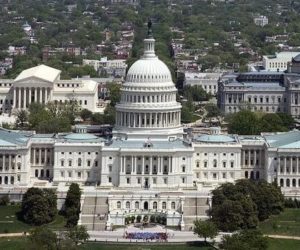
By Emily Flitter and Fiona Ortiz
CHICAGO (Reuters) – U.S. presidential candidate Donald Trump canceled a rally scheduled for Friday night in Chicago after the event turned into a chaotic scene with thousands of attendees split into opposing camps of supporters of the Republican front-runner and protesters inflamed by his candidacy.
A Trump campaign staffer took the stage nearly a half hour after the rally was slated to begin and said it would be postponed for safety reasons. A campaign statement issued slightly later said the event would be held on another unspecified day.
Following the announcement, the crowd began to chant and cheer. Scuffles broke out as signs were ripped from hands and police moved in to quickly defuse the most serious scuffles.
Cries of “We dumped Trump! We dumped Trump!” rose inside the University of Illinois at Chicago pavilion where the event was held.
An opposing group yelled: “We want Trump! We want Trump!”
Outside the pavilion, chants of “We shut it down!” rippled through the crowd on news of the cancellation.
Chicago activists had spent the week leading up to the rally planning how to disrupt it.
Trump has become a particularly polarizing candidate in the presidential campaign. He has both inspired impassioned supporters and ignited a backlash of angry dissent with his promise to build a wall along the U.S.-Mexican border to keep out illegal immigrants and his call to temporarily ban the entry of Muslims into the country.
One group at Friday’s event, Showing Up for Racial Justice, coordinated with minority student groups on campuses, using group email chains and messaging so that protesters could stay in constant communication.
One of the organizers, Nathaniel Lewis, 25, a master’s degree student in public health at the University of Illinois at Chicago, said he was shocked they succeeded in shutting the rally down.
“I’m happy, I’m at peace because we came together as a collective,” Lewis told Reuters.
“This is the last thing we expected to happen, it shows the power of unity.”
Trump, speaking to MSNBC by telephone shortly after the canceled event, said he met with law enforcement after arriving in Chicago. Though he believed it would have been possible to move forward, he said he made the “wise decision” to postpone the rally to keep everyone safe.
“We were not consulted or involved in the decision to cancel the event,” Chicago Police Department spokesman Anthony Guglielmi told Reuters.
Trump brushed off questions from MSNBC’s Chris Matthews about whether such widespread disruptions were to be expected given the increasingly aggressive tenor of recent campaign events.
Trump said his supporters had planned for a peaceful rally but it was derailed by the crowd of protesters.
“You can’t even have a rally in a major city in this country anymore,” Trump said. “Up until this point we’ve had no problem.”
Trump told MSNBC he expected support for his candidacy would only increase.
Earlier in the day, at a rally in St. Louis, Missouri, Trump had been speaking for less than 10 minutes when protesters began interrupting him. The disruptions continued over the next hour as Trump urged security to “get them out.”
“Can I be honest with you, it adds to the flavor, it’s more exciting. Isn’t this better than listening to a long boring speech?” Trump said of the disruptions.
At some events, altercations have turned physical. In New Orleans last week, several protesters supporting the Black Lives Matter movement were dragged out as Trump shouted “get them.”
In Fayetteville, North Carolina, on Wednesday, protesters interrupted Trump’s speech more than 16 times. One was punched as he was led from the arena.
Jedidiah Brown, 29, dashed onto the Chicago stage where Trump was expected to speak Friday and tore the campaign sign from the podium before police took him outside. He was not arrested.
“I was born and raised in Chicago so I felt it was my responsibility to let him know he’s not welcome here,” Brown said. “The message Trump is spreading all over the country, it doesn’t work here.”
Outside, Tess King, 25, a social sciences and law student, was carrying a sign that said “Chicago Rejects Trump.” King had tried to get into the rally but the event was canceled before she got in the door.
“I feel incredibly happy that in our city we managed, through peaceful expression, to make this happen,” King told Reuters.
As the crowd began to trickle out, Josh Glaspie, 28, smoked a cigarette on a sidewalk strewn with discarded signs. Glaspie, an Army veteran who is trying to open a restaurant in Chicago, said he supports Trump.
“Trump’s not racist,” Glaspie said. “These people don’t even know why they’re protesting.”
(Additional reporting by Ginger Gibson, Eric Walsh and Amanda Becker; Writing by Amanda Becker; Editing by Leslie Adler, Robert Birsel)
















